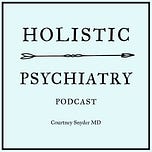Previously shared as a paid newsletter in May 2024.
In previous newsletters, I’ve addressed many of the more common contributing factors to brain symptoms, including high pyrroles, copper-zinc imbalances, methylation imbalances, candida overgrowth, mast cell activation, mold and other forms of toxicity, and genetic variants, such as COMT and MAOA.
Supplements can be needed to address each of these. Medication can also be necessary when treating mold and mast cell activation.
But what happens when someone can’t tolerate a supplement or medication because it worsens or creates new brain symptoms? Why, for example, could someone have problems tolerating B6 or SAMe or Methionine. Why might someone have problems with folate, niacinamide, glutathione, certain herbal treatments, antidepressants such as SSRIs, probiotics, antifungal medication or binders such as bentonite clay, activated charcoal, chlorella or cholestyramine?
In this newsletter, I’ll discuss:
Five common reasons a supplement or medication may worsen symptoms.
Specific supplements and medications that are more likely to do this.
How reactions may point to root causes.
Treatment steps that can improve tolerance.
There can be a wide range of brain symptoms that can occur when someone is having an adverse reaction, such as fatigue, brain fog, depression, anxiety, agitation, and even psychosis or mania. I’ll use “reactivity” to refer to this range of possibilities. While physical side effects can also occur, the focus here will be on brain symptoms.
5 Common Reasons Supplements or Meds May Worsen Symptoms
1. Immune Reactivity
Our immune system is intertwined with our central nervous system. When our body’s immune system reacts to a toxin, microbe, injury, or trauma, we can have inflammatory brain and physical symptoms.
“Feel Like I’m Reacting to Everything” - Mast Cell Activation
If someone is experiencing severe immune reactivity, such as mast cell activation, they may react to many supplements and medications, as well as triggers in their environment and stress. The number of triggers can help point to an exaggerated immune response. In my practice, this high immune reactivity is usually driven by mold toxicity.
For many with this obstacle, starting very low and slow can prevent reactions. For others, interventions may be needed to lower immune reactivity and stabilize mast cells. This, however, can require certain supplements. For those who can’t tolerate those treatments, limbic system retraining programs help calm the immune system so people can move forward more easily.
Sensitivity & Intolerance
It is possible to have immune sensitivity (or even allergy) to a supplement, though I find this less common. Herbal supplements, for example, which are high in salicylates, may cause symptoms in those with salicylate sensitivity. Certain probiotics have bacterial strains high in histamine. This is an issue for those with histamine intolerance.
2. Too Much or Too Little Neurotransmitter Activity
Some people with brain symptoms have high neurotransmitter (NT) activity, and some have low. Common NT’s include serotonin (5-HT), dopamine (DA), and norepinephrine (NE). I use the term “neurotransmitter activity” because it’s not just about the amount of neurotransmitters present; it’s also about the amount of receptors present that pick up NTs and remove them from the space between nerve cells.
High Neurotransmitter Activity
Too much neurotransmitter activity can cause brain symptoms such as mania, psychosis, agitation, anxiety, panic, obsessions, compulsions, and hyperactivity. Reactions can occur if supplements or medications are given that further increase NT activity.
Examples include:
Slow COMT (involved in clearing DA and NE) and/or slow MAOA (involved in clearing 5HT, DA and NE)
A variant on COMT and/or MAOA doesn’t mean they are being expressed.
What Increases Neurotransmitters?
SSRIs (Selective Serotonin Reuptake Inhibitor) increase serotonin activity
SNRIs (Serotonin and Norepinephrine Reuptake inhibitors) increase serotonin and norepinephrine activity.
Stimulant medications such as Ritalin and Adderall increase dopamine activity
SAMe and methionine increase serotonin and dopamine activity
Remember that there can be times when there is a mixed picture, such as when someone is undermethylated and has a slow COMT.
Low Neurotransmitter Activity
Reactions can occur if supplements or medication decrease the neurotransmitter activity when it is already low. This could look like depression, apathy, fatigue, and brain fog.
Examples include:
Fast COMT (involved in clearing DA and NE) and/or fast MAOA (involved in clearing 5HT, DA and NE). The NTs are getting cleared too fast.
What Decreases Neurotransmitters?
Folate, a nutrient that is good for a lot of people happens to be a big problem for many with psychiatric conditions. Most with underemethylation have low serotonin symptoms (depression and/or anxiety). While folate can help methylation, as an unfortunate aside, it can also further lower serotonin activity. Folate is in most multivitamins and B Complex vitamins. To learn more: Undermethylation, MTHFR & The Great Folate Debate.
Niacinamide can lowers DA and NE.
Looking closely at someone’s symptoms and traits and assessing methylation through bloodwork can help determine if NTs are too high, low, or mixed and what types of treatment to consider.
3. Poor Detoxification or Toxic Overload
Zinc
Zinc is one of the most powerful tools I use in my work. Some people can easily tolerate it, while others can struggle. Here are some reasons someone may not tolerate zinc.
High copper—Zinc mobilizes copper. Moving too much copper at once can increase copper symptoms (anxiety, anger, hyperactivity, insomnia).
High toxicity—Zinc is a strong antioxidant. It is needed for the genetic expression of one of the most important antioxidants in our body, metallothionein.
It took me 8 months to get my dose up to an optimal range, which is certainly not the norm. I unknowingly had significant mold toxicity at the time.
When I start someone on zinc, I slowly build it up over 3-4 weeks. For some (like myself), even this is too fast.
Glutathione
This is the other major antioxidant. If someone is having difficulty tolerating it, they may have problems with detoxification and significant toxicity (metals, biotoxins like mold, and chemicals). These can start to be addressed in several other ways.
Binders
These include bentonite clay, chlorella, activated charcoal, and cholestyramine. They bind toxins, especially mold toxins, in the GI tract. If they are started too quickly, the toxins they are supposed to remove get stirred up, which stirs up symptoms. When people say they can’t tolerate certain binders, they usually weren’t started low enough.
There are others, but these are the most common in my experience.
4. Underlying Microbial or Microbiome Issue
B6
B6 is very important for brain health. It is needed for making serotonin, dopamine, and GABA. We use it in all the Walsh nutrient protocols to varying degrees. In the last 10 years, we’ve seen a decrease in B6 tolerance. It’s not clear why. I’m including it in this section because the reactivity is suspected to be related to the microbiome. Perhaps in recent years, we have had collective damage to our microbiomes from toxins and rising EMF exposure. We don’t know.
The good news is that P5P, the active form of B6, is usually well tolerated. In my practice, I rely heavily on P5P. I will occasionally use it in combination with B6 (if tolerated) for those with especially high pyrroles.
Methionine and/or SAMe
Both are used, though usually not together, to help address undermethylation. I suspect candida or mold when someone is having difficulties tolerating either of these. These nutrients are usually better tolerated once candida and/or mold are addressed (or are starting to get addressed).
5. Die-Off
Anything that kills off microbes, such as candida or mold, can cause a “die off” of those microbes, release toxins, and worsen symptoms. Antifungal supplements, antifungal medication, and probiotics may cause this type of reactivity. Antifungal medications include nystatin, diflucan, itraconazole, and amphotericin B.
Herbs and food-based supplements can have antimicrobial effects. Turmeric is one example. There are many others, so it’s always worth checking. Worsening symptoms might point to an underlying fungal or other microbial overgrowth. It may also suggest that appropriate binders may be needed first.
Addressing or preventing die-offs could mean supporting detoxification, starting binders if necessary, and, again, starting low and going slow.
Antidepressants, interestingly, have been shown in labs to have antifungal effects. This does make me wonder if some people who can’t tolerate them are having die-off.
Root Causes
Knowing someone's history of reactions can help point to underlying root causes.
As you can see, there are typically ways to help someone tolerate and go on to benefit from a needed supplement or medication.
As always, I welcome your thoughts and experience.
Until next time,
P.S. To learn more about non-patient consultations, treatment, and monthly mentorship groups, please visit my website at:
Medical Disclaimer:
This newsletter is for educational purposes and not intended or implied to be a substitute for professional medical advice, diagnosis or treatment for either yourself or others, including but not limited to patients that you are treating (if you are a practitioner). Consult your own physician for any medical issues that you may be having.












Share this post